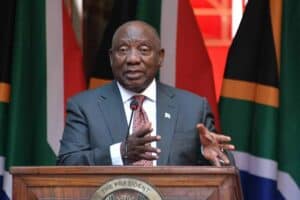The party said it was evident that De Klerk would only appreciate that apartheid was a crime against humanity if he faced prosecution.

The EFF is threatening to take legal action to ensure a forensic inquiry is opened into former president FW De Klerk after his foundation issued a statement on Friday stating: “The idea that apartheid was ‘a crime against humanity’ was, and remains, an ‘agitprop’ project initiated by the Soviets and their ANC/SACP allies to stigmatise white South Africans.”
In a statement released on Saturday, the EFF said it would also explore all legal options to reopen a forensic inquest into De Klerk, to look investigate all those who were killed by the state under his presidency, with the aim of prosecuting him for the apartheid murders.
The party said it was evident that De Klerk would only appreciate that apartheid was a crime against humanity if he faced prosecution.
“This sickening statement and the continued ‘rooi gevaar’ are instruments that were employed by the apartheid government to kill, arrest, torture, and banish freedom fighters. This is further an exoneration of the EFF’s correct and decisive actions against De Klerk during the opening of Parliament in 2020.
“What this further means is that De Klerk and his associates are not apologetic of the crimes of apartheid that deprived black people, and Africans in particular, of their humanity, dispossessed them of their land and all forms of socio-economic existence,” said spokesperson Vuyani Pambo.
Pambo said De Klerk’s apartheid denialism was also in violation of the United Nations resolutions that apartheid was a crime against humanity.
“Disregarding the United Nations and international law is a violation of the Constitution of South Africa, meaning that De Klerk has no regard of the democratic order.
Pambo said De Klerk was wrongly awarded a Nobel Peace Prize and that the EFF would write to the Nobel Peace Committee to have it withdrawn.
“De Klerk is refusing to take full responsibility for the crime that apartheid was. This is despite the so-called reconciliation that was imposed on our people by the political elite, who persuaded the masses of our people to forgive people who never asked for forgiveness.
“The EFF calls on government, parliament, and all peace-loving South Africans to isolate De Klerk and all apartheid apologists and apartheid denialists. Parliament and government must immediately stop all invitations to De Klerk, and if they fail to do so, the EFF will increase its militant protests against De Klerk, including through physically removing him from official events.
“The EFF will also develop a programme on all public appearances of De Klerk to remind him that apartheid is a crime against humanity. Furthermore, the South African state should withdraw all support it has been providing to this apartheid denialist,” Pambo said.
Meanwhile, the SACP said apartheid could not be justified in any manner whatsoever, contrary to what De Klerk had sought to do.
SACP spokesperson Alex Mashilo said: “The recent comments made by De Klerk trying to conceal the violent nature of apartheid and its involvement in generating and sponsoring what he called ‘black-on-black violence’ are unacceptable and must be condemned in the strongest terms possible.
“The so-called ‘black-on-black’ violence was, in essence, an apartheid war against the liberation movement and the oppressed, using the apartheid surrogates as its frontline storm troopers. The apartheid security apparatus was fully behind the so-called black-on-black violence.”
He added that De Klerk’s apology for the havoc and sufferings endured by millions of South Africans was therefore insincere.
“While we have made commendable social progress since ending the apartheid era in 1994, the hard fact is that our country is yet to overcome the legacy of apartheid. Therefore, the sufferings endured by the people as a result of apartheid are not limited to the generations of the oppressed that lived during the apartheid era but continue to varying extents as a result of its entrenched or persisting legacy.
“…. the unbanning of our organisations in 1990 was not a result of goodwill or change of heart by De Klerk. The unbanning of our organisations was a direct result of decades of struggle that led to the defeat and dislodging of the apartheid regime,” said Mashilo.
He said, despite the unbanning of political parties in 1990, many people were still unaccounted for to this day.
“The apartheid regime, through its repressive security apparatus, was behind their disappearance. The democratic government must deepen efforts to ensure accountability, closure and justice.
He said De Klerk’s statements trying to justify apartheid had far-reaching implications.
“What they reflect is that, while the formerly oppressed advanced and embraced reconciliation and the building of national unity guided by the principle of non-racialism, certain sections of the former oppressors did not embrace the transformation process,” said Mashilo.
For more news your way, download The Citizen’s app for iOS and Android.






